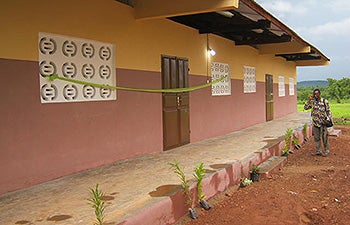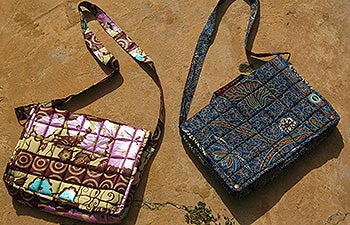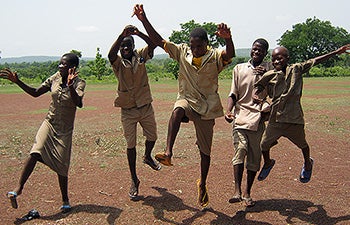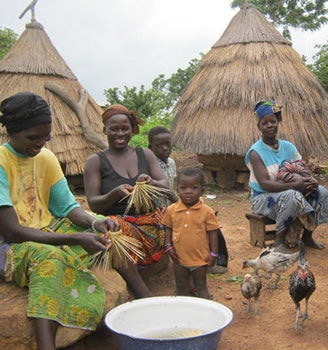A Rising Star
At 6 a.m., Brittany Berns would awake to the sound of her neighbors’ breakfast pans clacking. Nearby, roosters crowed and pigs snorted.
After grabbing a bite of rice and beans, Berns would pull a bucket of water from the well to wash her dishes and sprinkle her garden of flowers and fruit saplings — guava, oranges, bananas and papaya. By 8 a.m., she was teaching English to seventh and eighth grade students.
Berns arrived as a Peace Corps volunteer in Toucountouna, a rural village in Benin, Africa, two years after graduating in 2008 with a bachelor’s degree in international relations in USC Dornsife. She quickly realized that the school was in desperate need of additional classrooms. More than 1,000 students studied from morning until night in a total of 12 classrooms. The school lacked the space to house the final grade of secondary school, so determined students wanting to complete their studies had to make the journey to neighboring villages.

When Brittany Berns arrived in Benin, Toucountouna’s secondary school was so small that some classes had to be held outdoors. After the fundraising effort she spearheaded, a new school building was constructed, allowing 720 students to attend classes each day in its three classrooms. Photo courtesy of Brittany Berns.
Oftentimes instructors were forced to carry out their lessons outdoors. For those instances, Berns was lucky to have a whiteboard she brought with her from the capital city of Porto-Novo.
“The students sat on the dirt in the cold morning wind while I held the whiteboard in place against a tree to teach,” she recalled.
On occasion, Berns would have to teach at night because there weren’t enough classrooms available during the day to accommodate her 60 students. “I would have to teach by flashlight or end classes early because it was impossible to instruct the students.”
Berns spoke with the school’s principal about potential solutions. Though attempting to save up to build new classrooms, the school was short of the necessary funds. Berns decided to utilize the Peace Corps Partnership Program, which allows volunteers to post projects online to collect donations. All proceeds go directly to the projects.
“My students were hard working and enthusiastic about learning English and improving their critical-thinking skills,” Berns said. “I felt I had to do something to give them more space.”

As part of her fundraising effort to build a new school building at Toucountouna’s secondary school, Berns hired a tailor in Benin to construct colorful market bags and purses. Her friends and family sold the bags in the U.S. collecting $4,000 in donations. Photo courtesy of Brittany Berns.
Berns also found creative ways to raise funds for the building. Using her own money, she hired a tailor in the village to craft market and make-up bags, computer cases, and iPod covers with colorful fabric found in Toucountouna’s marketplaces. She sent the bags home to her family and friends in the United States, collecting $4,000 in donations from sales. Other Peace Corps volunteers also sent the bags home to garner donations.
According to the terms of the Peace Corps Partnership Program, the community was required to donate at least 25 percent of its budget to show their commitment to the project, which it did and then some. All together the efforts raised $21,500 to construct three new classrooms — $11,000 was raised through the partnership program and $10,500 came from the school’s Parent-Teacher Association and mayor’s office — no small feat.
“That’s a large amount for such a rural community,” Berns said. “It really shows their commitment to education. The community leaders were great partners and were fiercely committed to improving the school environment.”
Berns’ perseverance was no surprise to Wayne Glass, professor emeritus of the practice of international relations in USC Dornsife and Berns’ former professor.
“Brittany is not one to sit back and wait for something to happen,” Glass said. “I’ve always been impressed with her can-do attitude.”
With another endeavor in Benin, Berns has also committed to helping young women in Toucountouna continue their education by founding the Rising Stars scholarship program.
In the village, the government supports students’ schooling through the eighth grade, but after that families must pay for their children’s education. While many families foot the bill to send their boys to school, many decline to pay to educate young women. Girls are expected to help their mothers at home, and because they will likely go on to raise families of their own, paying for their education is not considered a high priority, Berns said.
“I noticed how energetic and motivated my female students were,” Berns said. “But while you will see that a seventh grade class might be 50-50 boys and girls, the 11th and 12th grade classes might have two female students out of 20.”

Berns’ students take a break from their studies to have some fun at the secondary school in Toucountouna, Benin. Photo courtesy of Brittany Berns.
Starting with a $200 donation from a friend in Benin — $50 covers a year’s worth of tuition, computer classes and supplies for one student — Berns began offering scholarships for young women seeking to continue their education. Interested students must apply by submitting an essay describing why education is important for females in Benin.
Berns was moved by a young applicant who wrote, “Women, just like men, deserve to have their eyes opened.” She knew she had to make the program permanent.
“That really motivated me,” Berns said. “The girl’s energy gave me purpose.”
Now 17 girls in Toucountouna are supported by the Rising Stars program. Working from her Brooklyn, New York, home, Berns oversees the program with help from a Benin-based supervisor. She established the program as a non-governmental organization with the Beninese government and is now going through the steps to launch it as a non-profit organization in the U.S.
Berns credits her time at USC Dornsife for helping to lay the foundation for her success abroad. During her junior year at USC Dornsife she participated in three consecutive overseas study programs. She attended an international summer school in Cambridge, England, to study British politics and literature, then spent her Fall semester in Paris taking classes in French, international relations and modern art. In the Spring, she attended the University of Aberystwyth in Wales where she studied international relations.
“The most beneficial thing about study abroad is that you’re going in and out of different environments and cultures and you have to adjust accordingly — you’re trying to get as much out of the culture as you can and at the same time feel comfortable and be accepted in your new environment.
“The study abroad experience taught me to adapt to new situations where I am by myself in a country where I don’t speak the language, or in a country like France where I do speak the language but I don’t understand the cultural cues,” she continued. “It really teaches you to pay attention to your surroundings and to the people.”

Berns’ neighbors in Toucountouna sit in a circle to craft using straw while their children look on. Photo courtesy of Brittany Berns.
During her freshman, sophomore and senior years, Berns participated in the Teaching International Relations Program (TIRP) at USC Dornsife, in which undergraduates teach international relations to local high schools students.
“TIRP really taught me a love for teaching kids who have enthusiasm for learning,” Berns said. “I remember teaching students about human rights and national security issues. I never got those types of lessons in high school. Some of these kids were just eating it up and very energetic. It made me want to teach young kids new things that they haven’t experienced.”
In fact, when Berns was preparing for her two-year Peace Corps assignment in Benin, she participated in the annual TIRP High School Leadership Conference as an alumna to re-sharpen her teaching skills.
“I hadn’t taught or tutored for a while at that point, so I wanted to bring my teaching tools back and not be so rusty,” she said.
Now, Berns is applying for master’s programs in public policy from her home base in New York as she manages the Rising Stars program taking place in Toucountouna.
“It’s something I really care about so I want to get it off the ground in the United States,” she said.
Glass, whom Berns keeps in touch with regularly, said he’s very proud of what she’s accomplished since she earned her diploma. “As I look toward her future, I think that her experience and her attitude is going to take her a long way in the world of policy.”
Success stories like Brittany’s are a message to her undergraduate colleagues at USC Dornsife’s School of International Relations, he noted.
“There are exciting opportunities out there that are part of the wider world,” Glass said. “Go for it!”